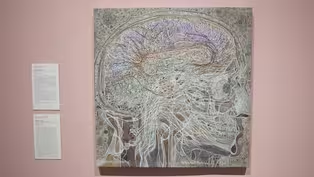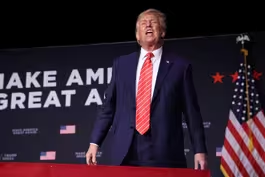
Trump names COVID lockdown skeptic to lead NIH
Clip: 11/27/2024 | 6m 54sVideo has Closed Captions
Trump names COVID lockdown skeptic to lead NIH, another sign of shifts in key agencies
President-elect Trump selected a critic of COVID-19 lockdowns and mandates to lead the National Institutes of Health. Dr. Jay Bhattacharya is known for co-authoring the Great Barrington Declaration, a 2020 manifesto that advocated allowing COVID to spread in order to achieve herd immunity. It was widely criticized by top health officials. William Brangham discussed more with Dr. Jennifer Nuzzo.
Problems playing video? | Closed Captioning Feedback
Problems playing video? | Closed Captioning Feedback
Major corporate funding for the PBS News Hour is provided by BDO, BNSF, Consumer Cellular, American Cruise Lines, and Raymond James. Funding for the PBS NewsHour Weekend is provided by...

Trump names COVID lockdown skeptic to lead NIH
Clip: 11/27/2024 | 6m 54sVideo has Closed Captions
President-elect Trump selected a critic of COVID-19 lockdowns and mandates to lead the National Institutes of Health. Dr. Jay Bhattacharya is known for co-authoring the Great Barrington Declaration, a 2020 manifesto that advocated allowing COVID to spread in order to achieve herd immunity. It was widely criticized by top health officials. William Brangham discussed more with Dr. Jennifer Nuzzo.
Problems playing video? | Closed Captioning Feedback
How to Watch PBS News Hour
PBS News Hour is available to stream on pbs.org and the free PBS App, available on iPhone, Apple TV, Android TV, Android smartphones, Amazon Fire TV, Amazon Fire Tablet, Roku, Samsung Smart TV, and Vizio.
Providing Support for PBS.org
Learn Moreabout PBS online sponsorshipWILLIAM BRANGHAM: President-elect Donald Trump has selected one of the nation's most prominent critics of COVID-19 era lockdowns and mandates to lead the National Institutes of Health.
Stanford University physician Jay Bhattacharya famously co-authored what's known as the Great Barrington Declaration, a 2020 manifesto that advocated allowing COVID to spread among most people in order to achieve herd immunity and focusing instead on protecting the elderly and other vulnerable groups.
It was widely criticized by top public health officials at the time.
For more on this pick, we are joined again by Jennifer Nuzzo.
She runs the Pandemic Center at Brown University's School of Public Health.
Jennifer, so good to have you back on the program.
So, Bhattacharya's tasked with running the NIH, the nation's preeminent biomedical research organization.
What do you make of this pick?
DR. JENNIFER NUZZO, Brown University School of Public Health: Well, it's a really controversial pick for a few reasons.
The first one is that,typically, the people tapped to lead these organizations, this organization, are people who have a long history of doing clinical research or maybe they have spent a long time working in laboratories doing laboratory research.
Dr. Bhattacharya is an economist and he is trained as a medical doctor, but he is an economist and he works more on policy.
So that's one way that that's controversial.
And then, of course, the second area of controversy is what you referenced, which is that, during the COVID-19 pandemic, he was a really outspoken critic.
He was one who really questioned a lot of issues.
And for that, I think people sort of worried whether his approach to this job will be driven by dogma versus evidence.
WILLIAM BRANGHAM: I mean, I went back and reread the Great Barrington Declaration.
And in hindsight, there is a part of it that does have some grains of truth.
And that was the low risk that COVID posed to young people and the larger risk of keeping them out of school for so long.
I mean, when you -- again, hindsight is always 20/20.
But when you look at that, how do you look at his COVID advocacy at the time?
DR. JENNIFER NUZZO: Yes, I mean, there are some things that I agreed with him on.
I think calling out school closures as being particularly harmful is something I very much agreed with him on.
Obviously, it's also true that those who are of advanced age were always at greatest risk of experiencing severe illness if they became infected with COVID.
So those points, he was quite right on.
I think what was quite challenging about the Great Barrington Declaration was that it proposed that we sort of only sequester people who are high risk and just sort of let everybody else go out potentially to get infected.
And even if you thought that was a reasonable idea, it was just impractical, because there was no way you could truly sequester people who were high-risk.
So that's where the real controversy comes from.
But at the end of the day, it was quite hard to figure out what was the right thing to do.
And people of all sorts, and myself included, didn't get everything right.
WILLIAM BRANGHAM: Right.
It's a novel virus.
That's why they call it that.
At the NIH, when you're in charge of marshaling the federal government's enormous resources and deciding what to focus on and what not to focus on, what's the concern there with someone like him at the helm of that organization?
DR. JENNIFER NUZZO: Well, so the concern for anyone tapped for this position -- and it is a really important position.
The NIH is a critically important agency for the U.S.
It's the place where, if you have a loved one with a rare disease or someone with a cancer, it's where you're going to look for cures.
So it is critically important for the nation's health.
It's also critically important as a driver of the U.S. economy.
And for every dollar that NIH spends, it contributes about 2.5 times that in terms of economic activity.
So it is a really important economic driver, as well as the place where people are hoping for cures.
You want anyone who's going to lead the agency to do so driven by evidence, not dogma.
You want to fulfill the obligations of the responsibility of the role, and not necessarily out of some kind of perceived loyalty to the person who appointed them.
That is true for everyone.
And it is my hope that, as a physician and as a researcher, that Dr. Bhattacharya will be driven by evidence.
He does have scientific training and he has done scientific research.
And so it's my hope he will use that scientific mind to look at the evidence and make decisions about the running of that organization and its outcomes as the evidence drives him, not due to personal grievances or any perceived dogma or biases.
WILLIAM BRANGHAM: When you look at him within the constellation of Trump's other selections, obviously, we have RFK Jr. at the very top of that pyramid.
He has been a wellspring of misinformation about vaccines.
Dr. David Weldon, the former congressman to run the CDC, he has also falsely linked vaccines and autism.
Dr. Marty Makary to run the FDA, along with several others.
When you look at this suite of individuals who will be running the nation's health policy, what is your overall sense of how this is going to go?
DR. JENNIFER NUZZO: So my biggest worry is really about the nomination for the secretary of the Department of Health and Human Services, and that is Robert F. Kennedy Jr.
Compared to the other nominees, he is really in a class all by himself.
Whereas I have some disagreements with some of the other nominees these are people who have training in the areas that they are going to be potentially overseeing.
They are people who have engaged in some level of considering evidence.
RFK Jr. stands out quite -- quite as a fringe character.
He has really made a whole career of not only not paying attention to evidence, but just pushing consistently debunked talking points just to fulfill an agenda that is really quite outside of the norm.
It is really quite fringe.
It is really quite considered wacky in many instances.
I mean, some of his views are just simply very strange.
So I am quite worried, because the head of HHS is the boss of all of these individuals.
And so, even if you have good people with good training and credible scientific minds at the helm, the question is always, what are they going to be able to do, given the fact that the person who may potentially run the Department of Health and Human Services really is one who is prone to favor conspiracy theories over actual evidence?
WILLIAM BRANGHAM: Jennifer Nuzzo at Brown University School of Public Health, as always, thank you so much.
DR. JENNIFER NUZZO: Thanks for having me.
'Brains and Beauty' explores how the mind processes art
Video has Closed Captions
Clip: 11/27/2024 | 6m 15s | 'Brains and Beauty' exhibit explores how the mind processes art and aesthetic experiences (6m 15s)
How psychology can help bridge divisions this Thanksgiving
Video has Closed Captions
Clip: 11/27/2024 | 10m 14s | Exploring how psychology can help bridge political divisions this Thanksgiving (10m 14s)
Israeli-Hezbollah deal learns from past, negotiator says
Video has Closed Captions
Clip: 11/27/2024 | 9m 52s | Israeli-Hezbollah cease-fire avoids mistakes of the past, U.S. negotiator says (9m 52s)
Trump's win signals acceptance of authoritarian leadership
Video has Closed Captions
Clip: 11/27/2024 | 6m 9s | How Trump's reelection signals a broader acceptance of authoritarian leadership (6m 9s)
Ukraine takes harsh measures to force draft dodgers into war
Video has Closed Captions
Clip: 11/27/2024 | 6m 26s | Lacking manpower, Ukraine resorts to harsh means to force draft dodgers into combat (6m 26s)
Providing Support for PBS.org
Learn Moreabout PBS online sponsorship
- News and Public Affairs

FRONTLINE is investigative journalism that questions, explains and changes our world.

- News and Public Affairs

Amanpour and Company features conversations with leaders and decision makers.












Support for PBS provided by:
Major corporate funding for the PBS News Hour is provided by BDO, BNSF, Consumer Cellular, American Cruise Lines, and Raymond James. Funding for the PBS NewsHour Weekend is provided by...




